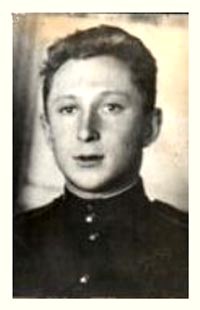Maksim Gitman was born in 1923 in Kiev to the family of a successful Soviet administrative functionary. According to his son Dmitrii, Maksim's paternal grandfather and great-grandfather were rabbis. Maksim graduated from a Ukrainian-language school. On June 22, 1941 the Soviet-German war began, and the city area in Kiev where the Gitmans lived was bombed in a German air raid. At the end of June Maksim was officially included in a column of pre-conscripts who were to be evacuated eastward for military training. At the beginning of July Maksim's parents were evacuated to Soviet Central Asia. The column with which the young Gitman was to be transferred to the Donbass broke up after the officers who were to lead them fled. Maksim returned to Kiev and volunteered for the people's militia (the opolchenie), a formation consisting of untrained or poorly trained civilians who were to carry out secondary military functions in the defense of the city. In August 1941 his formation was scattered and he was wounded and then evacuated from the combat area to the east. In November 1941 Maksim arrived in Tashkent, Central Asia, where he found his parents.
In the same month, still not having recovered, Gitman volunteered for the Red Army. He was sent to an infantry school, from which he graduated in May 1942. He did not receive officer rank due to numerous problems he created during his studies. In the summer of 1942 Maksim's division was deployed on the Voronezh Front (in southern Russia) and he became the commander of an anti-tank unit. He recalled the fighting for Voronezh and its vicinity as a nightmare or an "apocalypse," featuring enemy bombing and continuous shelling from enemy tanks and heavy mortars, etc. In August 1942, Gitman was seriously wounded and he returned to his regiment only in October, when the battle for Voronezh was going on. The city was recaptured by the Red Army in December 1942.
"Never in the war did I feel such horror as around Voronezh", Gitman noted.
Gitman admitted that it was the perspective of being captured by the Germans as a Jewish POW that frightened him most of all. "Many times during that war I felt a sense of fear, an abominable animal panic or fear, when there were situations that might have ended with me being captured. I had nightmares: I was in captivity, I was being interrogated, I was in a concentration camp. Such a scenarios were repeated many times: the specter of captivity did not leave my soul, nor did the specter of death, that could not have been worse than captivity."
In January 1943 Gitman was promoted to the rank of junior lieutenant. A short time later, despite his low rank, he was appointed commander of a company. In the winter and spring of 1943, he fought at the Seim River, where he was wounded once more. Gitman failed to take part in the early stage of the Kursk Salient operation, the greatest "meat-grinder" or blood bath of the Soviet-German war because he was then suffering from typhus in a military hospital. This disease may well have saved his life. Gitman did take part in the continuation of the operation in August of that year.
In September 1943 the Red Army offensive on Kiev began and Gitman was seriously wounded. In hospital he narrowly escaped the amputation of his leg. After his release, Gitman was dismissed from the army. His sole military award was the medal "For Battle Merit" (received after the fighting for Voronezh). Because of his many frontline infractions he was not proposed for military orders or other medals.
After the war Maksim Gitman settled in Leningrad (now St. Petersburg, Russia), where he worked as an engineer.
How Maksim Gitman took the decision to volunteer for the Red Army in November 1941
"A few days after our arrival [in Tashkent, Uzbekistan], in the morning I entered a completely empty chaikhane [teahouse] and sat down at a table with a bottle of beer. I poured myself a bowlful ... Suddenly, a huge Uzbek appeared in the teahouse and looked me over. Then he took out a knife and, with the clear intention to finish me, began to repeat in almost a chant: 'Jew! Go fuck your mother! I'll go to the front, and you'll stay here! Jew! Go fuck your mother! I'll go to the front, and you'll stay here!' ... What could I do? I threw my beer into his face, squeezed out the nearest window and escaped ... Fortunately, the window was almost at the ground level ... This episode, and especially the chat made such an impression on me that the day after, without saying a word to my parents, I went to the nearest recruitment office resolved to go to the front."







